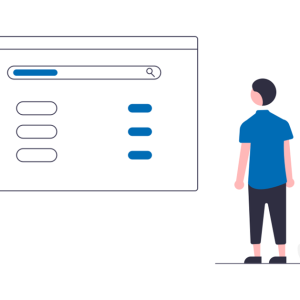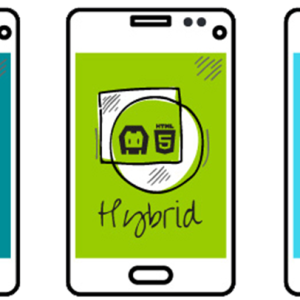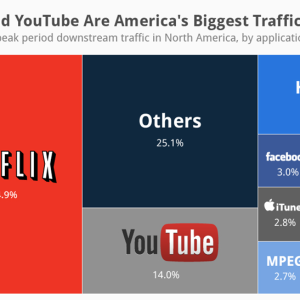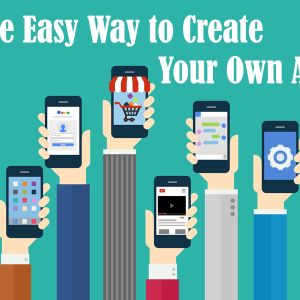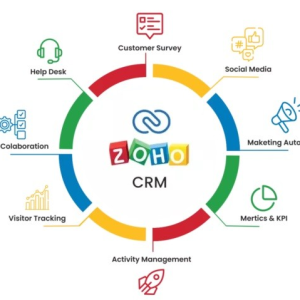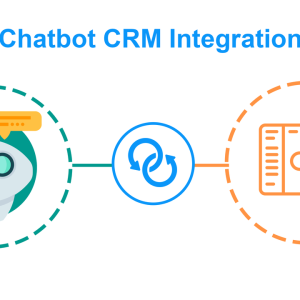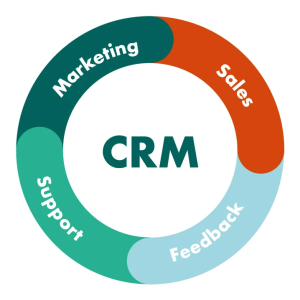Introduction
As of May 2022, over 60% of world wide web traffic comes from mobile devices. This represents a jump from 2016 to 2021, when the traffic share remained steady at roughly 50% for both desktop and mobile users.
As more and more people access the internet using their mobile devices, it has become increasingly important for businesses to have a website that is designed for mobile viewing. A website that is not designed for mobile viewing will look distorted and difficult to navigate on a small screen.
However, there are still many advantages to using a dedicated Mobile Application over a website, such as speed, offline access and push notifications. In this guide, we will explore the pros and cons of both web application vs mobile application development, to help you decide which is best for your business needs.
What Is A Responsive Website Design?

A responsive website design is a website that automatically adapts to the size of the screen it is being viewed on, whether it be a desktop computer, laptop, tablet, or smartphone. This means that the website will always look its best, no matter what device you are using.
How has website design changed with the advent of mobile applications
The design of websites has changed dramatically in recent years, as mobile apps have become increasingly popular. In the early days of the internet, most websites were designed for desktop computers, with large screens and mouse-based navigation. However, as more and more people started using smartphones and tablets, it became clear that a new approach was needed.
Nowadays, more and more websites are being designed with smaller screens and touch-based navigation in mind. This is known as responsive design, and it means that a website can adjust its layout and content to better suit the device it is being viewed on.
However, there are still many advantages to using a dedicated mobile app over a website.
The Advantages of using a Responsive Website Design

#1 It looks great on any device
Whether you’re using a desktop computer, a laptop, a tablet, or a smartphone, your website will look good no matter what. This is because responsive websites are designed to adjust automatically to the size of the screen you’re using, ensuring that all of your content is visible and easy to read.
#2 They are typically faster and more reliable than mobile apps
Since the website code is stored on a central server rather than on individual devices, there is less risk of downtime or errors due to device-specific issues. In addition, responsive websites can be cached, which means that they can be accessed even when you’re offline.
#3 Easier and cheaper to develop than mobile apps
This is because you only need to create one version of the website rather than developing separate versions for each device.
This can save you both time and money in the long run.
Of course, there are also some disadvantages to using a responsive website design. But we will discuss them later in the article.
The Advantages of Using a Dedicated Mobile Application
Now that we have learned about the advantages of a responsive website design, let us learn about the advantages of using a dedicated Mobile Application:
1. Speed: Mobile Applications are generally faster than websites, as they are specifically designed for mobile devices.
2. Offline Access: Mobile Applications can be used offline, which is ideal for situations where you don’t have an internet connection.
3. Push Notifications: Mobile Applications can send push notifications to users, which is a great way to keep them up-to-date with new content or special offers.
4. Greater Engagement: Mobile Applications are generally more engaging than websites, as they are designed to be used on smaller screens and have touch-based navigation.
5. Better Personalization: Mobile Applications can collect user data and use that information to provide a more personalized experience, tailoring the content to each user.
Why Do Web Application Vs Mobile Application Differ?
Web application vs mobile application has different purposes, and as a result, they offer different benefits and drawbacks.
Website design is for general browsing, while mobile apps are built for specific purposes, such as checking the news, ordering food, or chatting with friends. This means that websites typically have more features than mobile apps, but apps are often faster and more convenient to use.
Websites are accessed via a web browser on your mobile device, while mobile apps are downloaded and installed directly onto your device. This means that you need an internet connection to use a website, but you can use most mobile apps offline.
Mobile apps can send push notifications directly to your device, while websites can only send notifications if you have the web page open in your browser.
So, when it comes to choosing between a web application vs mobile application, it depends on your needs and preferences.
- If you need something quick and convenient, then a mobile app is probably the way to go.
- But if you want more features and functionality, then a website is the better option.
In conclusion, whether you choose to go with a website or a mobile app, the key is to ensure that your site or app provides a good user experience and meets the needs of your target audience.
The Ultimate Comparison: Web Application Vs Mobile Application

What are the Advantages of a Website over a Mobile App?
While we have discussed the basics, how about some comparison?
When it comes to choosing between a web application vs mobile application, there are many factors to consider. But in general, websites offer more features and functionality than mobile apps, while apps are often faster and more convenient to use.

Here are 10 advantages of using a website over a mobile app:
1. Websites are accessible anywhere, anytime
Unlike mobile apps, which are often restricted to specific platforms and devices, websites can be accessed from any device with an internet connection – whether it’s a desktop computer, smartphone, or tablet.
2. Websites are usually more customizable than mobile apps
Many businesses choose to have both a website and a mobile app for their customers, but if you’re only going to have one, a website is usually more flexible and customizable.
3. Websites can be updated more easily and frequently than mobile apps
Because websites are hosted on servers, they can be updated as often as needed without needing to go through an app store approval process.
4. Websites are generally more affordable than mobile apps
While there are free and low-cost options for building mobile apps, they can still be costly to develop, especially compared to websites, which typically have much lower development costs.
5. Websites can work offline, while mobile apps require a data connection
Many websites are designed to work even when users are offline, while mobile apps typically require a data connection to function.
6. Websites are easier to find in app stores and search engines than mobile apps
Because they are hosted on servers, websites often rank higher in search results than individual mobile apps, making them easier to discover and download for users.
7. Websites can be shared more easily than mobile apps
When users want to share a website with others, they can simply send them the URL, while sharing a mobile app requires sending a link to an app store or other location where it can be downloaded.
8. Websites don’t need to be installed, while mobile apps do
Users can access websites directly from their web browsers without needing to install any additional software, while mobile apps must be installed on a device before they can be used.
9. Websites can take advantage of browser features, while mobile apps are limited to the capabilities of the device
Because websites are accessed through web browsers, they can take advantage of features such as extensions, advanced search, and more, while mobile apps are restricted to the features and capabilities of the device they’re running on.
10. Websites can be updated very quickly in response to new information or trends, while mobile apps can take a long time to update
Due to their frequent updates and short development cycles, websites are often the best choice for businesses that need to stay up-to-date with the latest information or trends.
In conclusion, there are many advantages to using a website over a mobile app. Whether you’re looking for greater flexibility and customization, faster access, lower costs, or more features, a website is likely the right choice for your business needs.
What are the Disadvantages of a Website over a Mobile App?
The beauty of a competitive market is that where there are advantages, you will also find disadvantages. When it comes to choosing between a web application vs mobile application, there are a few key disadvantages to consider:
1. Websites are slower than apps.
2. Apps can be used offline, while websites require an internet connection.
3. Websites can’t be push-notified, while apps can.
4. Apps tend to have a more user-friendly interface than websites.
5. App users are generally more engaged than website users.
6. It’s easier to monetize an app than a website.
7. Apps can access native device features, while websites can’t.
8. Apps can be more addictive than websites.
9. App development is generally more expensive than website development.
10. You need to develop both an iOS and Android app if you want to reach the widest possible audience.
Whether you need speed, offline access, push notifications, user engagement, or something else, there are pros and cons to each approach that should be carefully weighed before making a decision. Ultimately, the best solution is the one that works best for you and your users.
Is It Cheaper to Create a Website or Mobile Application?
When it comes to creating a website or a mobile app, the cost can vary greatly depending on the scope and complexity of the project. For a basic website, you can expect to pay around $1,000-$5,000, while more complex websites or e-commerce stores can cost tens of thousands of dollars.
Creating a mobile app typically costs more than building a website, ranging from $5,000 to $50,000 or more. This is because mobile apps require more specialized programming and design skills, as well as access to backend databases and servers.
Whether you choose a website or a mobile app depends on your needs and budget. If you need a simple, straightforward solution, then a website might be the way to go. However, if you need a more complex solution with more features and functionality, then a mobile app is probably your best bet. Ultimately, the decision is up to you and what your business requires.
Which Businesses Have Preferred Mobile Applications Over Websites?
Businesses have increasingly been choosing to design their websites with mobile in mind, using responsive design techniques to make their sites look good on smaller screens. However, many businesses still find that having a dedicated mobile app is the best way to reach their customers.
Some of the most popular businesses that have chosen to go with mobile apps include banks, retailers, and news organizations. Banks find that mobile apps are a convenient way for customers to check their balances and make transfers. Retailers use mobile apps to offer exclusive deals and coupons to loyalty program members. News organizations use mobile apps to push breaking news stories and notifications to readers.
Real-Life Examples Of Businesses That Chose A Mobile Application Over a Website are:
Some well-known brands that have built Preferred Mobile Applications over Websites include Facebook, Uber, Airbnb, and Amazon.
Facebook has long been known for its desktop website, which is used by billions of people around the world. However, in recent years, the company has put a lot of focus on its mobile app, which offers many advantages over the website. For example, the app is much more streamlined and fast-loading, making it ideal for people on the go. It also allows users to access their accounts and post updates even when they don’t have an internet connection.
Similarly, Uber has built a strong reputation as a mobile-first service provider, offering on-demand car rides through its app. The app is convenient and easy to use, and it offers features that are not available on the website, such as the ability to see nearby cars and estimated arrival times.
Airbnb is another brand that has shifted its focus to mobile, with its app offering a more user-friendly experience than the website. The app allows users to book and manage their stays, as well as get recommendations from other travelers.
Finally, Amazon is a company that has always prioritized mobile, with its website being optimized for mobile viewing. However, the company recently launched an official mobile app that offers many additional features and benefits, including access to special deals and discounts, one-click ordering, and more.
However, you should never assume that just because something was successful for someone else it will automatically work in your favor.
The idea of “one size fits all” doesn’t apply when talking about life and fitness goals, so don’t let anyone tell you otherwise! Whichever mode of marketing you choose, make sure you test it out first to see which one works better for you.
Which Businesses Have Preferred Websites Over Mobile applications?
When it comes to website design, several brands have decided to stick with website design over mobile applications. Some of the reasons for this include cost, time, and complexity. It can be a lot cheaper and faster to create a website than it is to create a mobile app, especially if you need to develop for multiple platforms. Additionally, websites can be accessed by anyone with an internet connection, whereas mobile apps require a compatible device and software.
That said, some businesses have found great success with mobile apps. These businesses are typically those that provide a service or sell a product that is convenient to have on the go. For example, a business that sells tickets or provides reservations would be a good candidate for a mobile app.
When deciding whether to develop a website or a mobile app, it’s important to consider your target market and what they want.
Real-Life Examples Of Businesses That Chose A Website Over a Mobile Application are:
Starbucks
Their website is very user-friendly and allows customers to easily find information about their products, as well as locate nearby stores.
Even though they have developed several mobile apps, their website is still the most popular way to access their services.
Walmart and Target
Both companies have built comprehensive websites with tons of features, including shopping carts, product search engines, and customer support.
Walmart has even gone so far as to create a separate website for mobile devices, which is much more limited in functionality than their full website. This is likely because many consumers prefer shopping on their phones or tablets, making it more convenient for them to browse and buy products.
Similarly, Target has developed a mobile-friendly website that makes it easy for customers to shop from anywhere. They have also recently launched a mobile rewards app, which allows customers to easily scan and pay for items directly from their phones.
While these businesses have chosen to focus on website design over mobile applications, this may not be the right choice for all. The best choice only depends on you and your goals for your business.
Why Should You Consider Utilizing Both Websites And Mobile Apps For Your Businesses?
When it comes to designing a website, the priority is always making sure it looks good and functions well on desktop browsers. However, with the advent of mobile apps and responsive design, website designers must now also consider how their designs will look and function on smaller screens and mobile devices.
While some businesses may be content with just having a website, many are now also investing in mobile apps to provide a more streamlined experience for their customers. Mobile apps offer several advantages over websites, including faster loading speeds, offline access, and the ability to send push notifications directly to users’ devices.
With that said, there are still many situations where using a website makes more sense than launching a mobile app. For example, if you only need to provide basic information about your business (such as your contact details and opening hours), then a website may be all you need.
So, for the 100th time, when it comes to choosing between a web application vs mobile application, it depends on your needs and preferences.
Who earns more, a Web developer or an Android developer?
That’s a tough question to answer, as it depends on a variety of factors, such as experience, location, and industry. However, we can take a closer look at the average salaries for these two positions to get a better idea of who might be earning more.
According to the U.S. Bureau of Labor Statistics, the average salary for a web developer is $67,990 per year, while the average salary for an Android developer is $103,560 per year.
So, it would appear that Android developers are earning significantly more than web developers on average. However, it’s important to keep in mind that these are just averages and there will be many individual variations.
Several factors can affect how much a web developer or Android developer earns. For instance, experience level is a big factor. A more experienced web developer or Android developer is likely to earn more than someone who is just starting.
Location is also a factor. Developers in major metropolitan areas tend to earn more than those who are located in smaller cities or rural areas. And finally, the industry can also have an impact on earnings. Developers who work in industries with high demand for their skills (such as the tech industry) can command higher salaries than those who work in industries with less demand.
So, while Android developers do tend to earn more than web developers on average, several factors can affect individual earnings. It’s important to keep all of this in mind when considering these two career paths. Ultimately, the best choice will depend on your unique skills and preferences.
How to decide which is best for your business needs?
When it comes to choosing between a web application vs mobile application, it can be difficult to decide which is best for your business needs. But, here are a few factors to consider:
1. How important is speed to you?
Mobile apps are generally much quicker than websites, as they are designed specifically for mobile devices. This can be especially important if you need to access information quickly, or if you are selling products or services that require a fast response time.
2. How important is offline access?
Mobile apps can be used offline, whereas websites cannot. This can be a key factor if you need to be able to access your content even when there is no internet connection available.
3. Do you need push notifications or other advanced features?
Many mobile apps offer advanced features such as push notifications, geolocation tracking, and more, which are not commonly found on websites. Depending on your business needs, these extra features may be important to you.
So what’s the best way for your company to reach its customers? A website or a mobile app, right?!
Conclusion
Well, it turns out that this is not as easy- the answer depends on how much time and money you have. If your business has limited resources then going with just one platform may be impossible but don’t let those who say “you cannot do both” convince yourself into thinking there isn’t any hope because we’ve got some ideas about how YOU can make things work!
Ultimately, to find out which option is best for your business needs, it’s important to brainstorm the answers to these questions with your team.
For example: Do I need only a website or could my company also use mobile apps? What kind of budget do we have in mind – would cheaper options work better with our financial arrangement (e-commerce site vs native iOS/Android app)?
The answers will help guide decision-making when choosing between these diverse yet powerful technologies.
So, what are you waiting for? The world is your oyster!
As an entrepreneur, there’s no better feeling than knowing that all the hard work has led to something worthwhile. You should take advantage of every opportunity and make decisions with a clear mind because they can affect not only yourself but also future generations as well (in case it wasn’t already apparent).
And if you need help getting started, our team at 12 channels is happy to assist. Contact us today and let us show you how websites and mobile applications can benefit your business! You may be surprised at how well they work!


